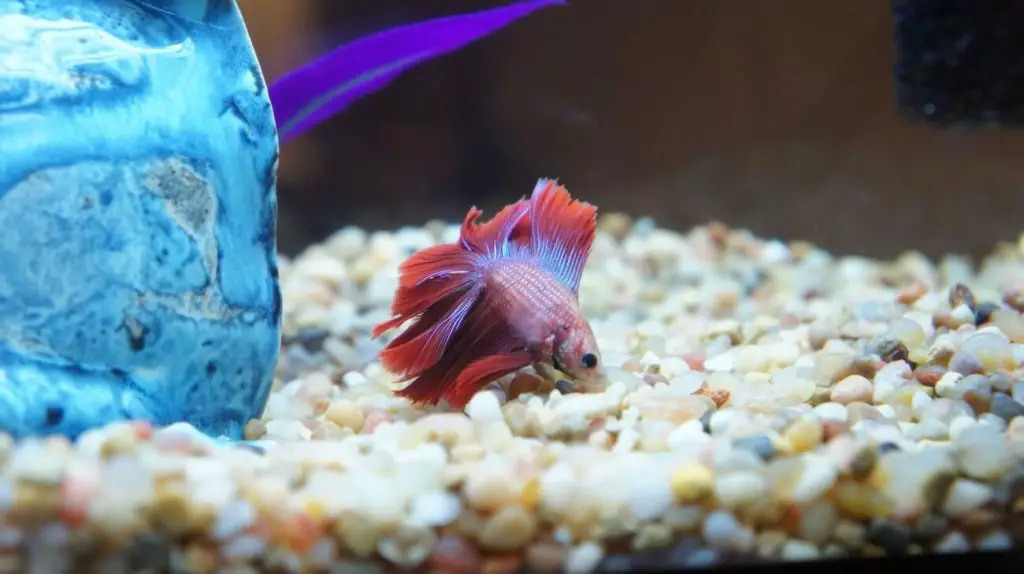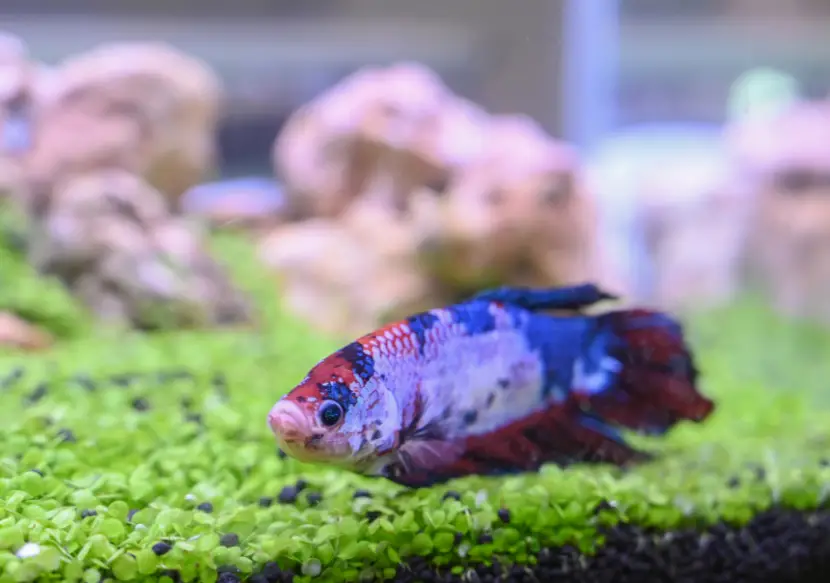Betta fish are known for their vibrant colors and unique personalities. These fish are commonly kept as pets in small tanks or bowls. However, it is not uncommon to see a betta fish staying at the bottom of their tank for extended periods of time. So, what causes this behavior?
One possible reason for betta fish staying at the bottom of their tank is stress. Bettas are sensitive creatures that can easily become stressed in the wrong environment. Other reasons include illness, water quality, and temperature fluctuations. In this article, we will explore the various reasons why your betta fish might be staying at the bottom of their tank and what steps you can take to help them thrive.
Betta fish may stay at the bottom of the tank due to various reasons, including stress, illness, poor water quality, or lack of oxygen. If you notice your Betta staying at the bottom for a prolonged period, it’s crucial to check the water parameters, ensure proper filtration, and add an air stone to increase oxygen levels. Additionally, provide a comfortable and spacious environment with hiding places and appropriate temperatures to reduce stress.

Why Does Betta Fish Stay at Bottom of Tank?
Betta fish are one of the most popular fish to keep as pets, but sometimes they exhibit unusual behavior. One of these behaviors is staying at the bottom of the tank. If you notice your betta fish hovering at the bottom of the tank, don’t worry, there may be a few reasons for this.
Water Quality
The most common reason why betta fish stay at the bottom of the tank is due to poor water quality. If the water is not clean, it can cause stress and illness, which can lead to lethargy and inactivity. Make sure you are changing the water regularly and using a water conditioner to keep the water clean and healthy for your betta fish.
It’s also essential to check the temperature of the water. Bettas are tropical fish and require water temperatures between 76 and 82 degrees Fahrenheit. If the water is too cold, it can cause the betta to become sluggish and stay at the bottom of the tank.
Stress
Betta fish can become stressed due to various reasons, including overfeeding, overcrowding, or poor water quality. When a betta is stressed, it may become inactive and stay at the bottom of the tank. To reduce stress in your betta fish, make sure you are feeding them the right amount and providing them with adequate space.
Illness
If your betta fish is staying at the bottom of the tank and not swimming around, it may be a sign of illness. Common health issues that can cause lethargy and inactivity in betta fish include swim bladder disease, fin rot, and ich. If you notice any other symptoms, such as loss of appetite or discoloration, it’s essential to consult a veterinarian who specializes in fish.
Natural Behavior
Sometimes, betta fish stay at the bottom of the tank because it’s their natural behavior. Wild bettas often hide in the substrate to avoid predators and to rest. In captivity, bettas may also rest and take breaks from swimming, especially if they have plenty of hiding spots and plants to explore.
Diet
Betta fish are carnivorous and require a high protein diet. If your betta fish is not getting enough protein, it can lead to lethargy and inactivity. Make sure you are feeding your betta fish a balanced diet that includes high-quality pellets and occasional live or frozen food.
Tank Size
Betta fish require a minimum tank size of 2.5 gallons, but larger tanks are always better. If your betta fish is staying at the bottom of the tank, it may be a sign that the tank is too small or overcrowded. Make sure your betta fish has plenty of space to swim around and explore.
Tankmates
Betta fish are known for their aggressive behavior towards other fish, especially males. If you have other fish in the tank with your betta, it may be causing stress and leading to lethargy. Consider separating your betta fish or choosing tankmates that are peaceful and compatible.
Benefits of a Healthy Betta Fish
A healthy betta fish is active, energetic, and responsive. When your betta fish is healthy, it will swim around the tank, explore its surroundings, and interact with you. A healthy betta fish can live up to five years, making it a long-term investment and rewarding pet.
Betta Fish vs. Other Fish
Betta fish have unique personalities and are known for their vibrant colors and flowing fins. They are also relatively easy to care for compared to other fish, making them an ideal choice for beginners. However, betta fish can be aggressive towards other fish, and they require specific water conditions to thrive.
Conclusion
In conclusion, betta fish staying at the bottom of the tank is not always a cause for concern. It may be due to poor water quality, stress, illness, natural behavior, diet, tank size, or tankmates. By understanding the reasons behind your betta fish’s behavior and providing them with adequate care, you can ensure they remain healthy and happy for years to come.
Frequently Asked Questions
Why does Betta Fish stay at the bottom of the tank?
It is common for Betta Fish to stay at the bottom of the tank for various reasons. The first reason is that they may be experiencing some stress, which can be caused by factors such as poor water quality or overcrowding. Stress can cause Betta Fish to become lethargic and remain at the bottom of the tank.
Another reason why Betta Fish may stay at the bottom of the tank is because they are sick. Some common illnesses that can cause this behavior include swim bladder disease or bacterial infections. If you notice other symptoms such as loss of appetite or rapid breathing, it is important to take action immediately and consult with a veterinarian or experienced fish keeper.
How can I improve the water quality in my Betta Fish tank?
One of the most important things you can do to improve water quality in your Betta Fish tank is to perform regular water changes. This will help remove excess waste and other harmful substances from the water. You should also avoid overfeeding your Betta Fish as this can lead to excess waste in the tank.
Another way to improve water quality is to add live plants to the tank. Live plants can help absorb excess nutrients and provide oxygen for your Betta Fish. Additionally, make sure to use a high-quality water conditioner to remove chlorine and other harmful chemicals from tap water before adding it to the tank.
What should I do if my Betta Fish is not eating?
If your Betta Fish is not eating, it could be a sign of illness or stress. First, check the water quality and make sure it is within the appropriate range for Betta Fish. If the water quality is good, try offering your Betta Fish a different type of food. Some Betta Fish are picky eaters and may prefer one type of food over another.
If your Betta Fish still refuses to eat, it may be a sign of illness. Some common illnesses that can cause loss of appetite include bacterial infections and parasites. In this case, it is important to seek help from a veterinarian or experienced fish keeper who can diagnose and treat the underlying issue.
Can Betta Fish live with other fish?
Betta Fish are known to be aggressive towards other fish, especially males. If you want to keep Betta Fish with other fish, it is important to choose peaceful species that are not likely to provoke aggression in your Betta Fish. Some good tank mates for Betta Fish include neon tetras, guppies, and corydoras catfish.
It is also important to provide plenty of hiding places and plants in the tank to help reduce aggression and provide a sense of security for all fish. However, it is generally recommended to keep Betta Fish in their own tank to avoid any potential issues.
How often should I feed my Betta Fish?
Betta Fish should be fed small amounts of food once or twice a day. Overfeeding can lead to health problems and excess waste in the tank. It is important to choose a high-quality Betta Fish food that is appropriate for their dietary needs and avoid giving them human food or treats.
If you are going to be away and unable to feed your Betta Fish, you can purchase an automatic feeder or ask a trusted friend or family member to feed them in your absence. However, it is important to provide clear instructions on how much and how often to feed your Betta Fish to avoid overfeeding.

4 Reasons Why Betta Fish Lay At The Bottom Of The Tank
In conclusion, there are several reasons why Betta fish may stay at the bottom of their tank. It could be due to stress, illness, or simply a natural behavior. As responsible pet owners, it is important to monitor our Betta’s behavior and provide them with a suitable and comfortable environment to thrive in.
If your Betta fish is showing signs of illness or stress, seek the advice of a veterinarian or experienced fish keeper. It is also essential to maintain good water quality and provide a varied and nutritious diet to keep your Betta healthy and happy.
Ultimately, understanding our Betta’s behavior and needs can help us provide them with the best possible care. With proper care and attention, our Betta fish can live long and fulfilling lives, bringing joy and beauty to our homes.
